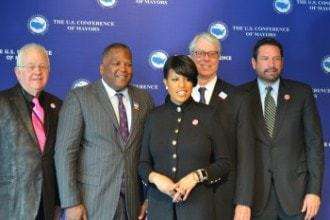
By Michael H. Cottman
Days before the Iowa caucuses, the nation’s largest association of black Republicans is endorsing Donald Trump, a candidate with little history of working on civil rights, housing or other traditional African-American issues.
“We, the grassroots activists of the National Black Republican Association, are pleased to announce our endorsement of Donald J. Trump for President of the United States of America,” Frances Rice, co-founder and chairman of the National Black Republican Association, wrote Jan. 22 in an essay on the association’s website.
“As citizens who happen to be black, we support Mr. Trump because he shares our values,” Rice wrote in an essay that alluded to the candidate’s current position on abortion.
“We, like Mr. Trump, are fiscally conservative, steadfastly pro-life and believers in a small government that fosters freedom for individuals and businesses, so they can grow and become prosperous,” she wrote.
The black Republican group contrasted sharply with a recent conclave of all-Democratic mayors. Led by Mayor Stephanie Rawlings-Blake (D – Baltimore), two weeks before the first votes are cast in the 2016 presidential race, a multicultural coalition of local chief executives from across America met in Des Moines, Iowa, to shift the debate to urban issues.
Gathering in the Hawkeye State’s largest city, these key mayors presented their proposal at The Brown & Black Presidential Forum.
“The 2016 Compact for a Better America: A Call to Action” urges the Democratic presidential candidates and the Republican-controlled Congress to boost federal spending and invigorate America’s urban centers. According to the 2010 Census, 81 percent of Americans live in cities and metropolitan areas.
These mayors aimed to explain how smaller municipalities often experience some of the same social challenges that plague inner cities across America.
“We believe mayors are the elected officials closest to the people and, thus, are best suited to know the challenges working families grapple with every day,” Rawlings-Blake, president of the U.S. Conference of Mayors, told Urban News Service.
“We also know that, many times, those challenges are felt more acutely in minority communities,” she said. “This is precisely why we are calling on the presidential candidates and Congress to take seriously our mayors’ Compact for a Better America urging that we invest in and protect our cities and urban centers.”
Large cities and small towns alike are experiencing similar problems including insufficient jobs, limited access to quality healthcare, illegal immigration, rising crime, unlawful guns and scarce affordable housing, the mayors said.
The mayors also released a 16-point plan to overhaul U.S. urban centers. It specifically recommends that America bolster “the Metro-City economic engines that drive the national economy; invest in and modernize the D+ rated transportation system; and educate and train a 21st Century USA workforce.”
“The issues of Des Moines and of cities around Iowa are the same issues that face mayors around the country each and every day,” Tom Cochran, executive director of the U.S. Conference of Mayors, said in a statement. “We support The Brown & Black Forum in its mission to present to the next President of the United States the challenges and opportunities before us, and we believe it is critical that mayors participate.”
The mayor’s urban agenda arrives just as the Democratic and Republican presidential candidates prepare for the all-important Feb. 1 Iowa caucuses and court voters in major cities and rural areas.
Race figures prominently among Democratic presidential contenders, in part, because most African-Americans traditionally vote Democrat, although some black Republicans are becoming more vocal in this contest through blogs and online pronouncements.
Meanwhile, Democrats say they support policies that would revitalize urban centers, if they could get the Republican-controlled Congress to cooperate.
As presidential candidate Sen. Bernie Sanders (D – Vermont) appeals to black voters by backing the Black Lives Matter movement, former secretary of state Hillary Clinton recently secured the endorsement of 50 African-American current and former mayors. This could help Clinton solidify the black vote behind her presidential bid.
Neither of the two Republican front-runners has offered an urban blueprint. However, real estate tycoon Donald Trump and Sen. Ted Cruz (R – Texas) both say they want to create jobs and strengthen the economy, which, they say, will benefit all Americans.
“Jobs, growth and opportunity will reignite promise for millions of American families who are currently being crushed by the Obama economy,” says Cruz’s website. “The best way to jump-start growth is through fundamental tax reform.”
“Real immigration reform puts the needs of working people first — not wealthy globetrotting donors,” says Trump’s website. “We are the only country in the world whose immigration system puts the needs of other nations ahead of our own. That must change.”
Trump currently leads Cruz nationally and, increasingly, in Iowa and New Hampshire, according to most major polls. Voters will decide in November which candidate — and whether Democrats or Republicans —has the best plan to lead America forward.
In a recent roundtable with black leaders in Baltimore, where black gang-related homicides and shootings are climbing, Mayor Rawlings-Blake offered sobering support for her campaign to increase funding for urban centers.
“This is a very important conversation,” Rawlings-Blake said about the growing crime problem. “It’s almost exclusively us killing us. We’re losing a generation one life at a time.”
